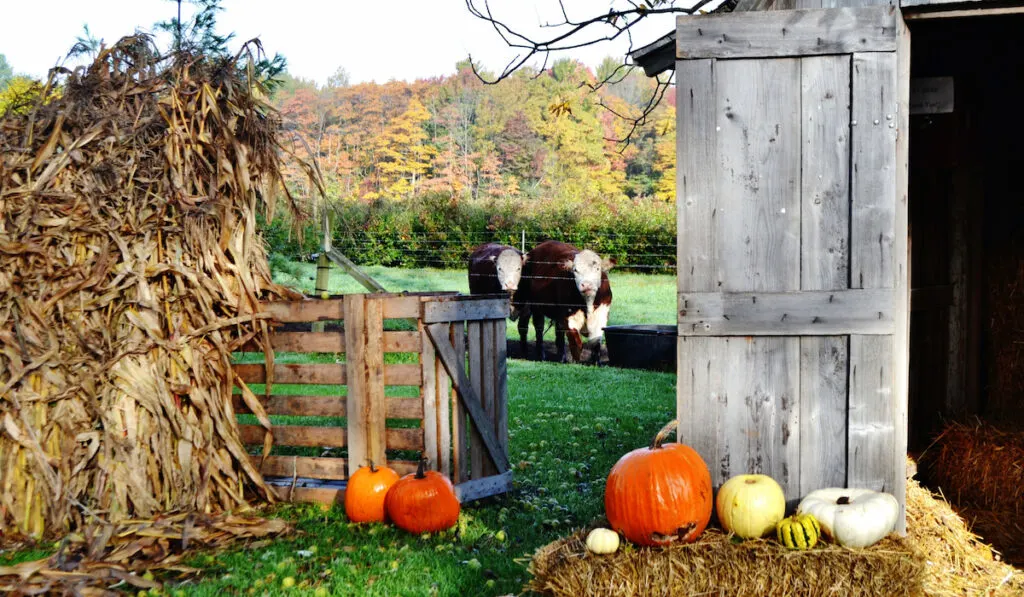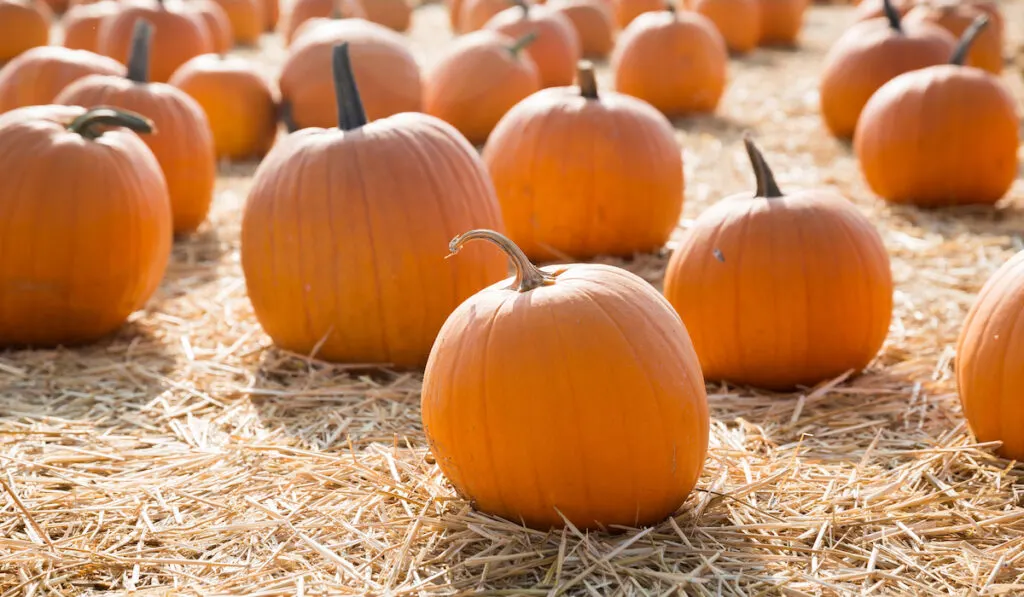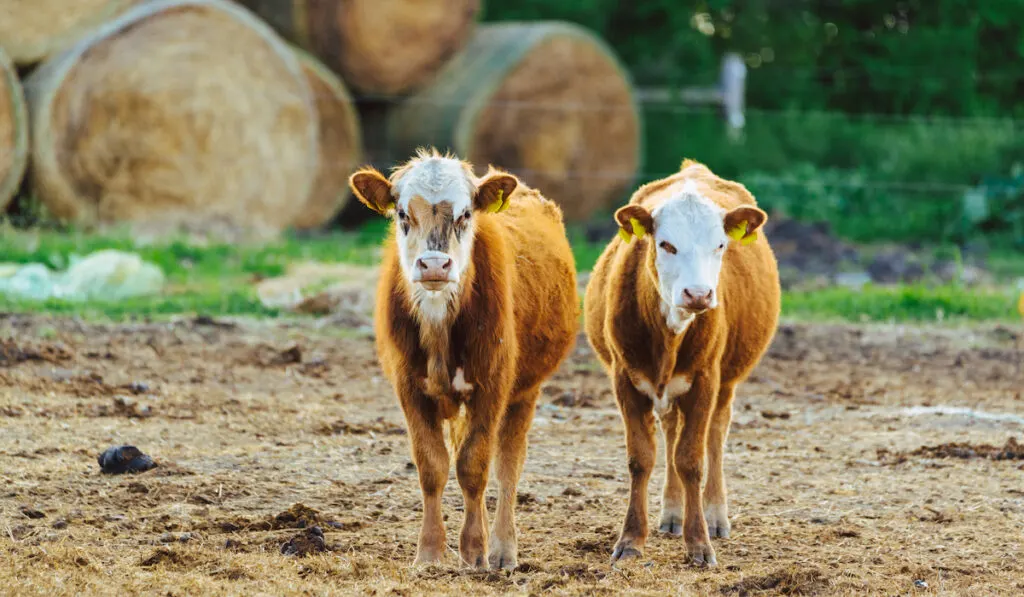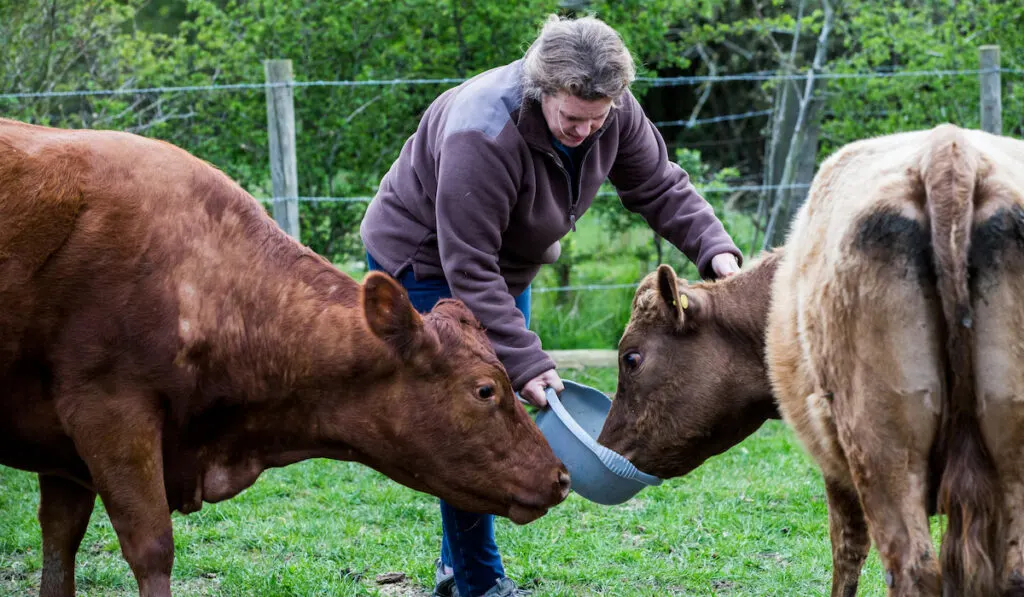Feeding cattle can be pretty expensive, especially in winter when foliage becomes scarce. At such times, cattle farmers typically look to alternatives that will not adversely affect the health of their cows. One option they consider is pumpkin.
Can cows eat pumpkin? Cows can eat pumpkins, and they find them palatable too. Apart from being tasty, cattle benefit from the high moisture content, dry matter digestibility, and crude protein of pumpkins. Plus, when it is consumed in moderate amounts, pumpkin is generally considered safe for cattle.

Like anything animals consume, pumpkins should be consumed in reasonable amounts. The consumption of large quantities of pumpkin at once may precipitate digestive issues.
If you have leftover pumpkins lying around, the cows will have no issue biting through them. But they may experience difficulties chewing through whole pumpkins. So, ensure you smash whole squashes into smaller bits before offering your cows.
Besides moderate feeding, there are other simple steps you should take before feeding pumpkins to your cattle. And we explain them in the rest of this article.

Table of Contents
Benefits of Pumpkins to Cows
Pumpkins are not only tasty to cows; they are also beneficial to cattle health. The following are some of the benefits of pumpkins to cows:
Pumpkin Improves Digestion
About 80 to 88% of a pumpkin squash is made up of water and one cup of pumpkin is estimated to have about 2 to 7 grams of dietary fiber.
Water and fiber improve digestion. Fiber stimulates rumination, saliva production, and chewing cows. Then water promotes various biochemical reactions involved in the process of digestion. Together, they make digestion easier for cows.
It Helps Cows Fight Worms
Various studies have shown that some cucurbitacins have anthelmintic properties. In other words, the cucurbitacins can help treat worm infestations.
The studies revealed that the anti-worm effect of the compounds has been observed in humans and livestock, including cows. So, if your cow consumes pumpkins, especially the seeds, you just might be helping it fight worm infestation.
Interestingly, the anti-worm effect of the compounds will also improve digestion.

It Serves As Growing Ration for Young Calves
When considering only the dry matter, pumpkins have a protein content of about 14 to 17%. Since protein promotes growth, pumpkins are valuable as supplemental food for young calves.
Pumpkin Is Useful as Supplemental Feed For Pregnant Cows
The crude protein content of dry pumpkin matter stands at about 14 to 17%, which is pretty high. Then every 100 grams of pumpkin contains around 26 calories.
So, pumpkins can serve as a valuable source of protein and energy for pregnant cows.
Pumpkin May Promote Milk Production in Dairy Cows
As said before, about 80 to 87% of a pumpkin is made up of water. So, by adding pumpkins to the diet of your cows, you are increasing their moisture consumption.
Increased moisture consumption in cows may promote milk production in pregnant cows.
Nutrition Facts
Pumpkins contain the following nutrients:
- Vitamin B6 – Vitamin B6 is vital for normal nerve and cardiovascular function in cattle. Deficiency in this vitamin may lead to hemorrhages and demyelination of peripheral nerves.
Besides that, vitamin B6 may promote lactation in dairy cows.
- Magnesium – Magnesium is essential in cows for various reasons. One of these reasons is that it promotes nerve functions. Deficiency states may trigger nervousness and nerve excitability in cattle.
Apart from that, magnesium serves as a co-factor for many enzymes. So, it promotes protein synthesis and energy metabolism.
- Calcium – Calcium is not only valuable in bone and teeth formation; it also promotes lactation in dairy cows.
Calcium is essential for normal nerve functions in cattle. Then again, promotes the rapid return to ovulation after calving. Also, it reduces the rate of uterine infection in female cows.
- Vitamin E – Vitamin E is an antioxidant. So, it aids with stress in cows. But beyond that, it also promotes growth and improves immune function.
In calves, sufficient vitamin E supplementation can prevent muscular dystrophy.
- Folate – When protected from degradation in the rumen, folate may improve reproduction in cattle. It may also promote milk production in dairy cattle.
- Vitamin C – vitamin C is not really essential to cows. Most of the ascorbic acid in their diet gets destroyed. So, they depend on the vitamin C their body produces.

How to Feed Pumpkins to Cattle
- When feeding pumpkins to cattle for the first time, start with small amounts. Then with time, you can increase how much pumpkin you add to their diet.
- You can let the cows roam into the pumpkin patch and eat at will. This appears to be the easiest way to feed them.
- Alternatively, you can get some pumpkins from the patch and place them around the cattle so they can eat them. You may smash the squashes in the cattle feeders or just leave them lying around the place where the cows roam.
- To make things easy for the cows, chop them into smaller bits. Cattle prefer eating chopped pieces of pumpkins instead of larger ones since chewing is less complicated.
Are Pumpkin Seeds Dangerous to Cows?
Pumpkin seeds are not dangerous to cows or any other animal. At one point, opinions were divided on this. But it is pretty clear now that pumpkin seeds do not harm cattle or any other livestock.
Contrarily, pumpkin seeds might actually be beneficial to animals like cows.
The seeds of a pumpkin contain a group of compounds called cucurbitacin. These compounds have various medicinal properties, including deworming properties.
Final Thoughts
Cows can eat pumpkins, and whenever they do, they enjoy it. But besides the enjoyment that comes with pumpkins, cattle get multiple benefits from them.
Whenever you try to feed pumpkins to your cows, chop the squashes into smaller bits. Pumpkins are preferably offered to cattle in chopped bits because they are easier to chew.
Resources
- https://www.medicalnewstoday.com/articles/279610
- https://www.vetpoultry.com/blogs/barn-talk-livestock-health-and-nutrition/can-pets-and-livestock-eat-leftover-halloween-pumpkins
- https://farmdesire.com/can-cows-eat-pumpkins/
- https://newsroom.unl.edu/announce/beef/4452/25555
- https://www.livestrong.com/article/432566-is-pumpkin-a-high-fiber-food/
- https://healthyeating.sfgate.com/canned-pumpkin-used-high-fiber-7152.html
- https://www.ncbi.nlm.nih.gov/pmc/articles/PMC5037735/
- https://www.tandfonline.com/doi/full/10.1080/01652176.2012.734640
- https://www.jscimedcentral.com/VeterinaryMedicine/veterinarymedicine-5-1162.pdf
- https://www.dairyglobal.net/Nutrition/Articles/2017/5/Benefits-of-vitamin-B-for-dairy-cows-134124E
- https://nrm.co.nz/2018/06/25/magnesium-supplementation-for-dairy-cows/
- https://www.researchgate.net/publication/257639065_Magnesium_in_dairy_cow_nutrition_An_overview
- https://www.feednavigator.com/Article/2020/01/13/Benefits-of-calcium-for-reproductive-outcomes-in-dairy-cows
- https://www.gov.mb.ca/agriculture/livestock/production/beef/vitamin-e-requirements-for-finishing-cattle-and-beef-cows.html
- https://www.feednavigator.com/Article/2016/02/24/Rumen-protected-folic-acid-may-boost-dairy-cattle-production-reproduction
